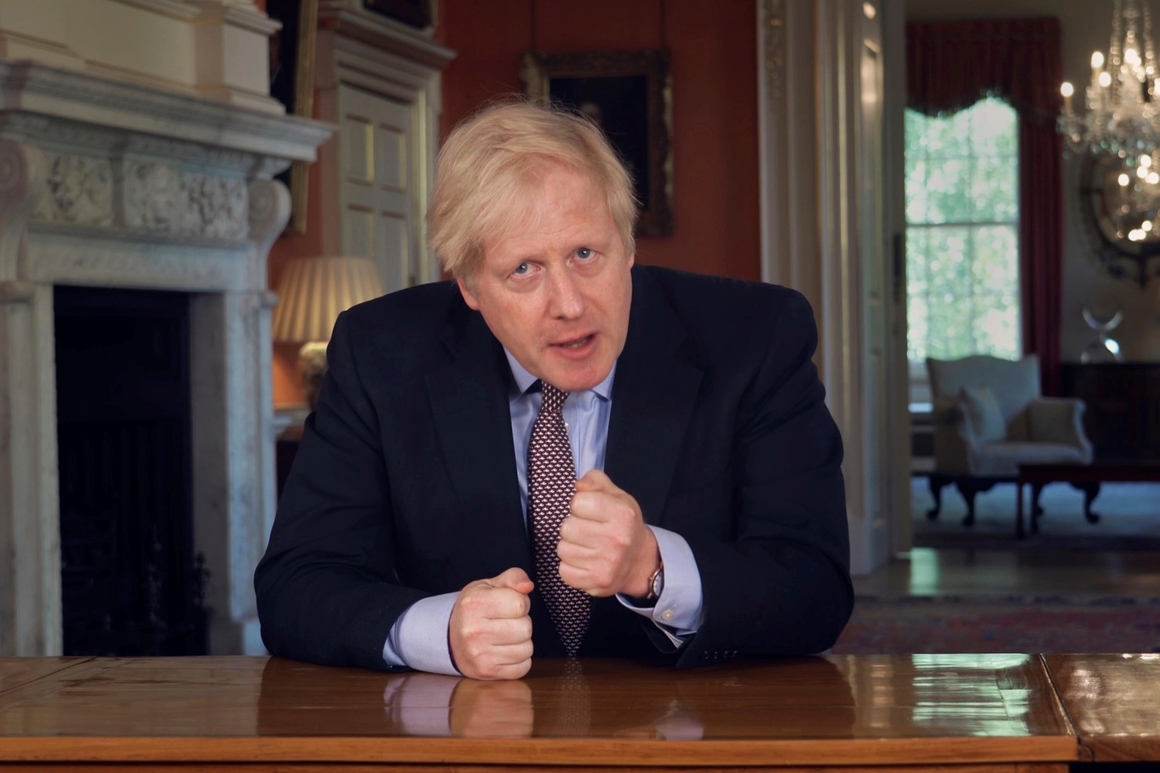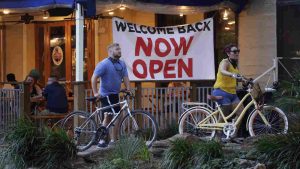LONDON — The gloves are off as Britain starts to examine its
handling of the coronavirus pandemic.
Boris Johnson on Wednesday insisted it was “premature” to say
the U.K. had made mistakes in its response to the crisis, after a
top adviser said the country’s
death toll could have been halved if it had gone into lockdown
just one week earlier.
Neil Ferguson, who led the Imperial College team behind the
influential epidemic model that informed U.K. strategy, earlier in
the day told MPs the epidemic had been doubling every three to four
days before the lockdown was introduced at the end of March.
“Had we introduced lockdown measures a week earlier, we would
have reduced the final death toll by at least a half,” said
Ferguson, who advises the government via the Scientific Pandemic
Influenza Group on Modelling (SPI-M) and was previously a member of
the government’s independent Scientific Advisory Group for
Emergencies (SAGE) — before
having to resign over a breach of lockdown rules.
But Johnson, speaking at the government’s daily press conference
shortly after Ferguson made the remarks, said it was “simply too
early to judge ourselves.”
“We made the decisions on the guidance of SAGE, including
Professor Ferguson, that we thought were right for this country,”
he said.
The U.K. government is facing mounting criticism over its
handling of the pandemic, specifically that lockdown measures were
imposed too late, that testing and protective equipment for medical
staff were not widely available quickly enough, and that the
government failed to protect vulnerable residents of care
homes.
More than 41,000 people have died in the U.K. after testing
positive for the coronavirus, far above estimates back in April,
including from Ferguson himself, that between 7,000 and 20,000
people might die of the virus. The actual death toll, based on the
number of death certificates mentioning the virus, is estimated to
be more than 50,000 and is still rising, and the country looks
likely to be
the worst-affected in Europe.
Jonathan Ashworth, the Labour opposition’s health spokesperson,
said the government “must accept they made mistakes and reassure
they have learnt lessons.”
“The tragic reality is Boris Johnson was too slow to take us
into lockdown, too slow on [personal protective equipment] for
health and care staff, too slow on testing and now too slow on
putting in place a functional test and trace regime,” he said.
Acting leader of the Liberal Democrat party Ed Davey called on
Johnson to commit to a full public inquiry into the government’s
decisions during the pandemic.
Asked at the press conference to name his biggest regret about
the response, Johnson said, “Of course we’re going to have to
look back at all of it and learn the lessons that we can,” but
insisted there were still “lots of things that we still don’t
know and this epidemic has a long way to go, alas, not just in this
country but around the world.”
However, his Chief Medical Officer Chris Whitty gave a frank
response to the same question. “There’s a long list of things
we need to look at very seriously,” he said, citing in particular
the U.K.’s slowness to increase its testing capacity at the start
of its outbreak. “Many of the problems that we had came because
we were unable to actually work out exactly where we were and were
trying to see our way through the fog,” Whitty said.
Ferguson’s comments overshadowed the latest announcement on
lockdown easing in England, which will see people living alone and
single parents permitted to form a “support bubble” with one other
household. Two households in a bubble will no longer have to
observe the U.K.’s 2-meter social distancing rule with one another
and will be able to stay overnight in each other’s homes.
Giving evidence to the House of Commons science and technology
committee on Wednesday, Ferguson also said that government policy
“failed” to shield care homes from the infection.
Ferguson had told the same committee at the end of March that
according to his modeling, the U.K.’s Covid-19 death toll —
which now stands at 41,128 deaths after a confirmed test — would
not exceed 20,000.
Asked on Wednesday what had gone wrong, he cited the fact that
the epidemic was further advanced in the U.K. in the first two
weeks of March than experts had realized, but also the high number
of deaths in care homes.
“We … made the rather optimistic assumption that somehow —
which was policy — that the elderly would be shielded and
particularly the most vulnerable would be shielded as the top
priority,” Ferguson said. “And that simply failed to
happen.”
Matt Keeling of the University of Warwick, another SPI-M adviser
also giving evidence to the committee, told MPs he would “echo
Neil’s comments, with hindsight we could have gone into lockdown
earlier. One of the main constraints we were facing at the time was
the advice that the population at large would resent a very long
lockdown. We were almost balancing that against the chaos that a
lockdown would cause.”
A third expert, Nicholas Davies of the London School of Hygiene
and Tropical Medicine, concurred, telling the committee, “It’s
clear from our own modeling looking back that an earlier lockdown
would have been substantially better in terms of the health
outcomes we have seen, in terms of deaths.”
Want more analysis from POLITICO? POLITICO Pro is our premium
intelligence service for professionals. From financial services to
trade, technology, cybersecurity and more, Pro delivers real time
intelligence, deep insight and breaking scoops you need to keep one
step ahead. Email [email protected] to request a
complimentary trial.



















